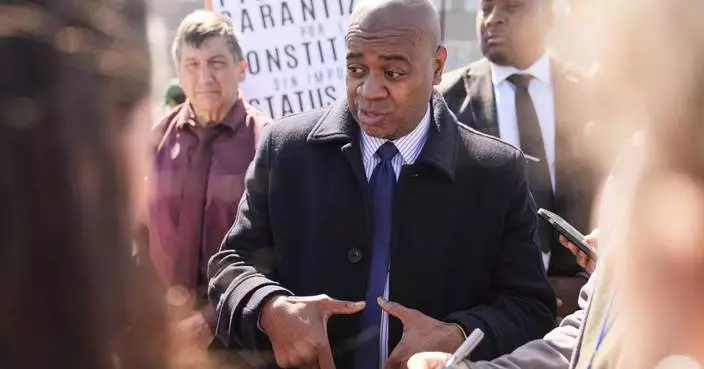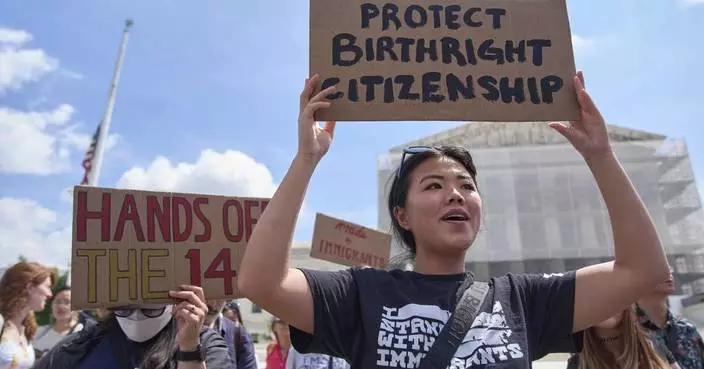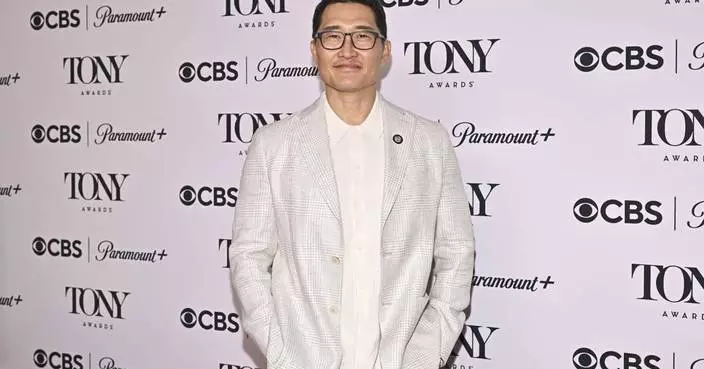NEW YORK (AP) — Sarah Palin’s 8-year-old defamation claims against The New York Times were being heard anew Tuesday by a Manhattan jury after they were revived by an appeals court last year.
Lawyers for the one-time Alaska governor and Republican vice presidential candidate and the newspaper told the civil jury that they will show through testimony and exhibits how a 2017 editorial was written and corrected.
Palin has asserted that the newspaper defamed her by falsely linking her campaign rhetoric to a mass shooting.
In his opening statement, attorney Shane Vogt told jurors that the newspaper had engaged in a “sickeningly familiar pattern” by targeting a popular Republican personality.
He told jurors they would learn the effects of the editorial on his client when Palin testifies, likely early next week.
The Times admits it made an error, but its attorney Felicia Ellsworth said in her opening that the newspaper “corrected the record as loudly, clearly and quickly as possible.”
She said the correction was posted within 14 hours, and jurors will have to conclude that the newspaper's editors knew they were saying something false and said it anyway to reach a verdict against the Times and its former editorial page editor, James Bennet.
Palin sued the Times for unspecified damages in 2017, accusing it of damaging her career as a political commentator with the editorial about gun control published after U.S. Rep. Steve Scalise, a Louisiana Republican, was wounded when a man with a history of anti-GOP activity opened fire on a congressional baseball team practice in Washington.
In the editorial, the Times wrote that before the 2011 mass shooting in Arizona that severely wounded former U.S. Rep. Gabby Giffords and killed six others, Palin’s political action committee had contributed to an atmosphere of violence by circulating a map of electoral districts that put Giffords and 19 other Democrats under stylized crosshairs.
In a correction, the Times said the editorial had “incorrectly stated that a link existed between political rhetoric and the 2011 shooting” and had “incorrectly described” the map.
Elizabeth Williamson, a feature writer at the Times who was on the editorial board in 2017 and came up with the idea for the editorial to address the effects of political rhetoric, was the trial's first witness.
Ellsworth asked her if she had any negative feelings toward Palin.
“No,” she answered.
The trial is occurring after the 2nd U.S. Circuit Court of Appeals in Manhattan restored the case last year.
In February 2022, Judge Jed S. Rakoff rejected Palin’s claims in a ruling issued while a jury deliberated. The judge then let jurors deliver their verdict, which also went against Palin.
In restoring the lawsuit, the 2nd Circuit said Rakoff’s dismissal ruling improperly intruded on the jury’s work. It also cited flaws in the trial, saying there was erroneous exclusion of evidence, an inaccurate jury instruction and a mistaken response to a question from the jury.

Former Alaska Gov. Sarah Palin leaves federal court Tuesday, April 15, 2025, in New York. (AP Photo/Larry Neumeister)
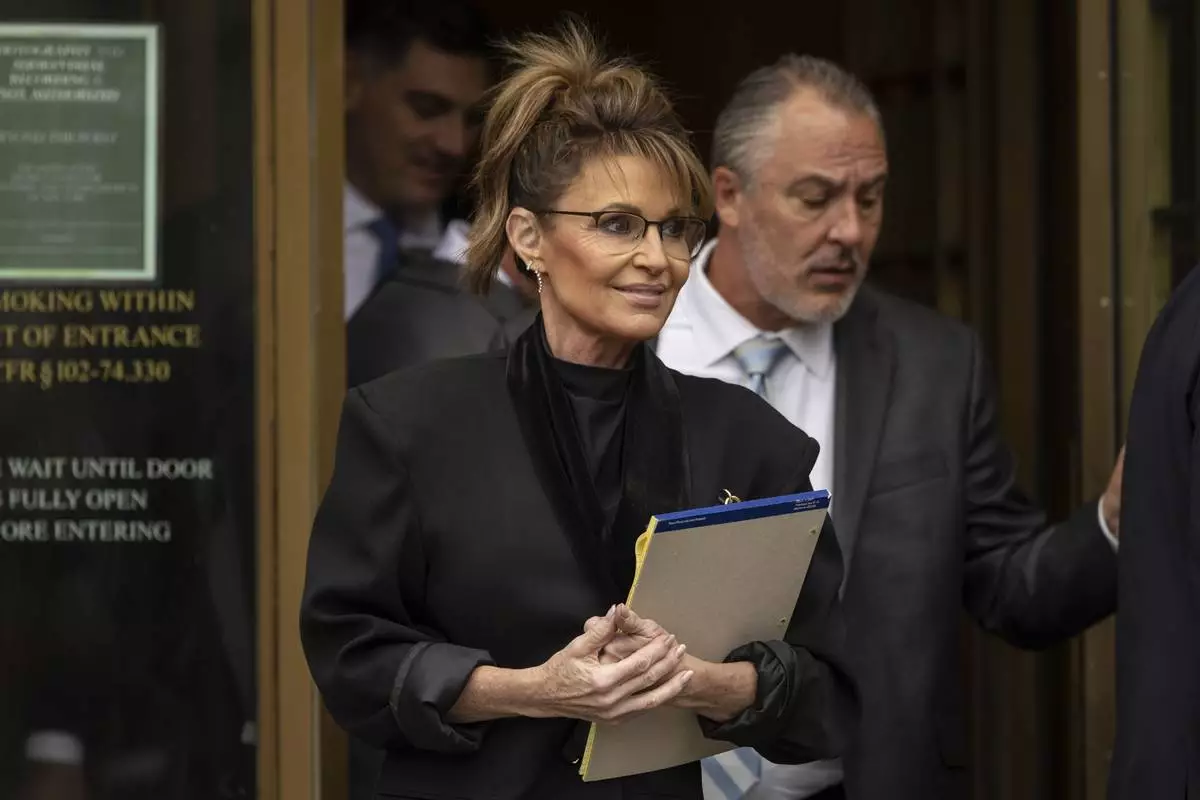
Former Alaska Gov. Sarah Palin leaves Manhattan federal court, Monday, April 14, 2025, in New York. (AP Photo/Yuki Iwamura)
WASHINGTON (AP) — The Supreme Court on Thursday weighed whether to allow President Donald Trump’s restrictions on birthright citizenship to temporarily take effect in most of the country, even if they might ultimately be found to violate the Constitution.
The justices heard arguments in the Trump administration's emergency appeals over lower court orders that have kept the citizenship restrictions on hold across the country. Nationwide, or universal, injunctions have emerged as an important check on Trump's efforts to remake the government and a mounting frustration to the Republican president and his allies.
Judges have issued 40 nationwide injunctions since Trump began his second term in January, Solicitor General D. John Sauer told the court at the start of more than two hours of arguments.
Birthright citizenship is among several issues, many related to immigration, that the administration has asked the court to address on an emergency basis, after lower courts acted to slow the president’s agenda.
The justices are also considering the Trump administration’s pleas to end humanitarian parole for more than 500,000 people from Cuba, Haiti, Nicaragua and Venezuela and to strip other temporary legal protections from another 350,000 Venezuelans. The administration remains locked in legal battles over its efforts to swiftly deport people accused of being gang members to a prison in El Salvador under an 18th century wartime law called the Alien Enemies Act.
Trump signed an executive order on the first day of his second term that would deny citizenship to children who are born to people who are in the country illegally or temporarily.
The order conflicts with a Supreme Court decision from 1898 that held that the Citizenship Clause of the 14th Amendment made citizens of all children born on U.S. with narrow exceptions that are not at issue in this case.
States, immigrants and rights group sued almost immediately, and lower courts quickly barred enforcement of the order while the lawsuits proceed.
The current fight is over the rules that apply while the lawsuits go forward.
The court's liberal justices seemed firmly in support of the lower court rulings that found the changes to citizenship that Trump wants to make would upset the settled understanding of birthright citizenship that has existed for more than 125 years.
Birthright citizenship is an odd case to use to scale back nationwide injunctions, Justice Elena Kagan said. "Every court has ruled against you,” she told Sauer.
But if the government wins on today’s arguments, it could still enforce the order against people who haven’t sued, Kagan said. “All of those individuals are going to win. And the ones who can’t afford to go to court, they’re the ones who are going to lose,” she said
Several conservative justices who might be open to limiting nationwide injunctions also wanted to know the practical effects of such a decision as well as how quickly the court could reach a final decision on the Trump executive order.
Justice Brett Kavanaugh pressed Sauer with a series of questions about how the federal government might enforce Trump’s order.
“What do hospitals do with a newborn? What do states do with a newborn?” he said.
Sauer said they wouldn’t necessarily do anything different, but the government might figure out ways to reject documentation with “the wrong designation of citizenship.”
Kavanaugh continued to press for clearer answers, pointing out that the executive order only gave the government about 30 days to develop a policy. “You think they can get it together in time?” he said.
The Trump administration, like the Biden administration before it, has complained that judges are overreaching by issuing orders that apply to everyone instead of just the parties before the court.
Justice Sonia Sotomayor was among several justices who raised the confusing patchwork of rules that would result if the court orders were narrowed and new restrictions on citizenship could temporarily take effect in 27 states.
Some children might be “stateless,” Sotomayor said, because they'd be denied citizenship in the U.S. as well as the countries their parents fled to avoid persecution.
New Jersey Solicitor General Jeremy Feigenbaum, representing 22 states that sued, said citizenship could “turn on and off” for children crossing the Delaware River between Camden, New Jersey, where affected children would be citizens, and Philadelphia, where they wouldn't be. Pennsylvania is not part of the lawsuit.
One possible solution for the court might be to find a way to replace nationwide injunctions with certification of a class action, a lawsuit in which individuals serve as representatives of a much larger group of similarly situated people.
Such a case could be filed and acted upon quickly and might even apply nationwide.
But under questioning from Justice Amy Coney Barrett and others, Sauer said the Trump administration could well oppose such a lawsuit or potentially try to slow down class actions.
Supreme Court arguments over emergency appeals are rare. The justices almost always deal with the underlying substance of a dispute.
But the administration didn't ask the court to take on the larger issue now and, if the court sides with the administration over nationwide injunctions, it's unclear how long inconsistent rules on citizenship would apply to children born in the United States.
A decision is expected by the end of June.
Follow the AP's coverage of the U.S. Supreme Court at https://apnews.com/hub/us-supreme-court.
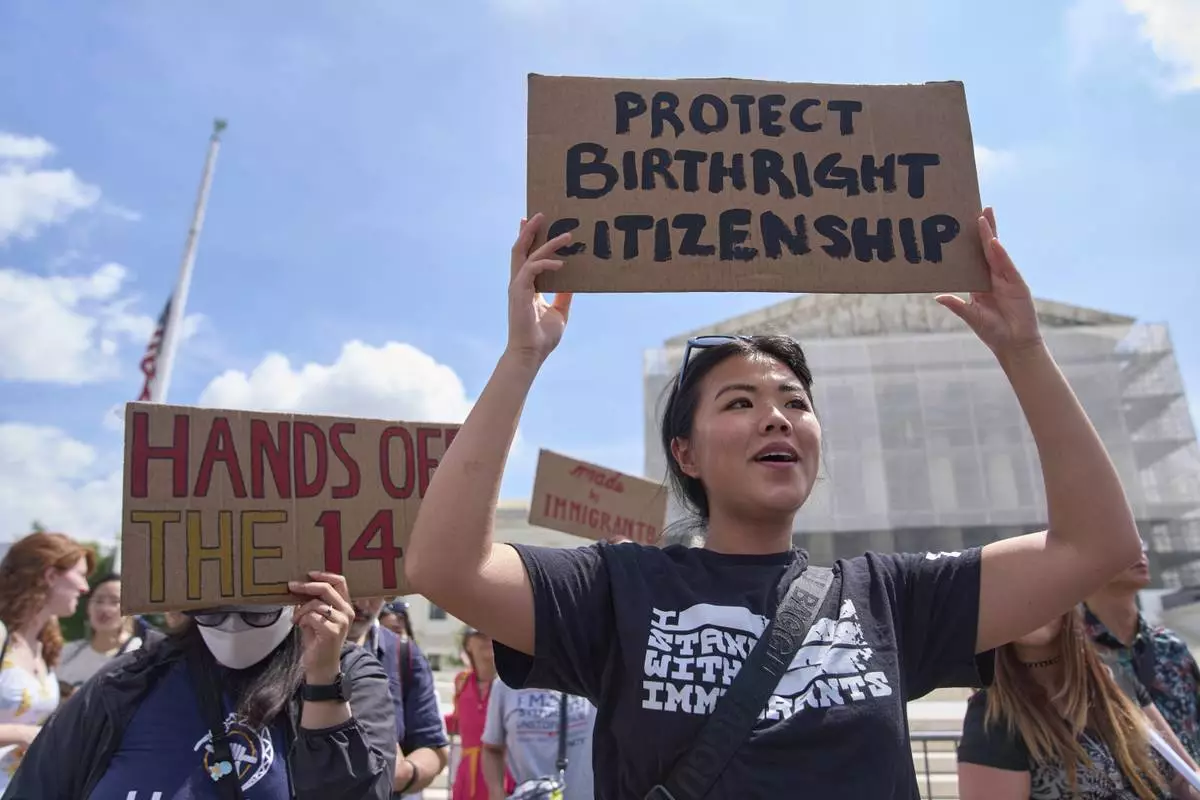
Hannah Liu, 26, of Washington, holds up a sign in support of birthright citizenship, Thursday, May 15, 2025, outside of the Supreme Court in Washington. "This is enshrined in the Constitution. My parents are Chinese immigrants," says Liu. "They came here on temporary visas so I derive my citizenship through birthright." (AP Photo/Jacquelyn Martin)
![Tanjam Jacobson, of Silver Spring, Md., holds a sign saying "Citizenship is a Birthright," Thursday, May 15, 2025, outside the Supreme Court in Washington. Jacobson is a naturalized U.S. citizen who was born in England of Indian descent, and her son was born here. "This is something that really matters," says Jacobson, "it's so wrong against the constitution [to take away birthright citizenship]." (AP Photo/Jacquelyn Martin)](https://image.bastillepost.com/1200x/wp-content/uploads/global/2025/05/2c495cddc1436e21a9fa976d295dc292_Supreme_Court_Birthright_Citizenship_26310.jpg.webp)
Tanjam Jacobson, of Silver Spring, Md., holds a sign saying "Citizenship is a Birthright," Thursday, May 15, 2025, outside the Supreme Court in Washington. Jacobson is a naturalized U.S. citizen who was born in England of Indian descent, and her son was born here. "This is something that really matters," says Jacobson, "it's so wrong against the constitution [to take away birthright citizenship]." (AP Photo/Jacquelyn Martin)
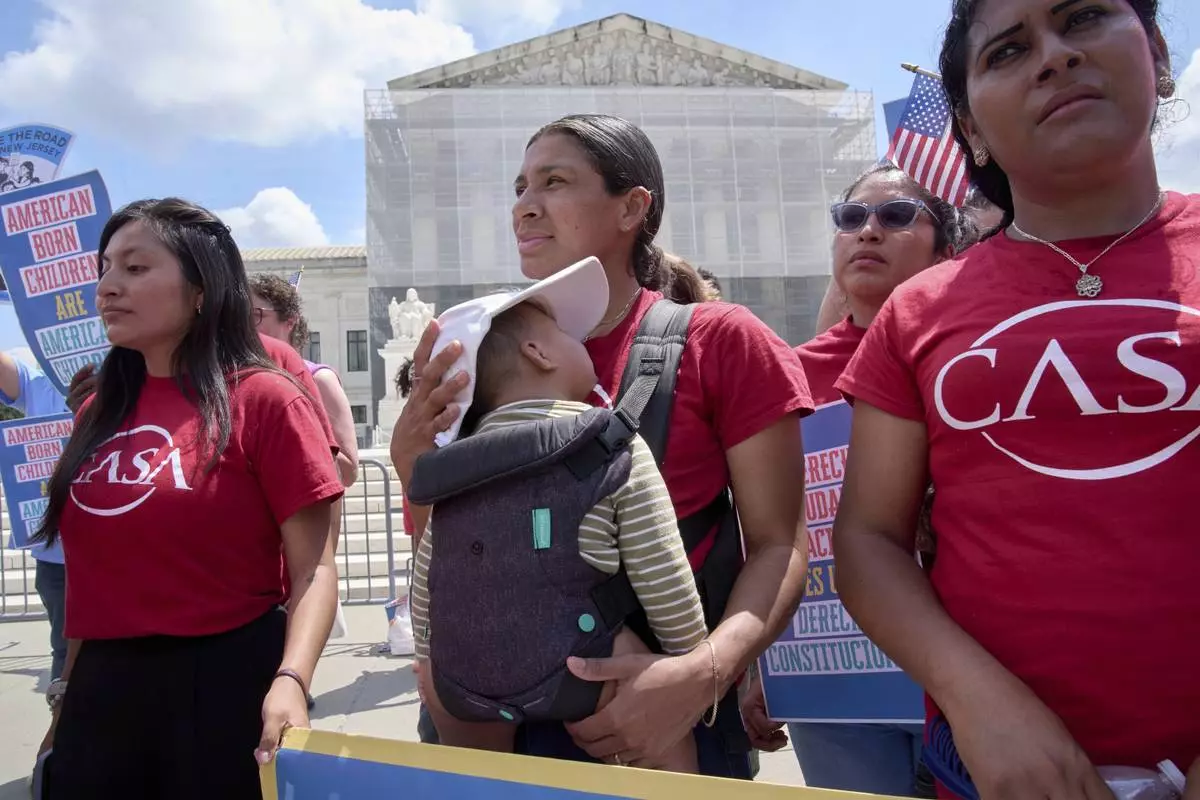
A woman from CASA Maryland holds her 9-month-old baby as she joins others in support of birthright citizenship, Thursday, May 15, 2025, outside of the Supreme Court in Washington. (AP Photo/Jacquelyn Martin)






![Tanjam Jacobson, of Silver Spring, Md., holds a sign saying "Citizenship is a Birthright," Thursday, May 15, 2025, outside the Supreme Court in Washington. Jacobson is a naturalized U.S. citizen who was born in England of Indian descent, and her son was born here. "This is something that really matters," says Jacobson, "it's so wrong against the constitution [to take away birthright citizenship]." (AP Photo/Jacquelyn Martin)](https://image.bastillepost.com/1200x/wp-content/uploads/global/2025/05/2c495cddc1436e21a9fa976d295dc292_Supreme_Court_Birthright_Citizenship_26310.jpg.webp)




